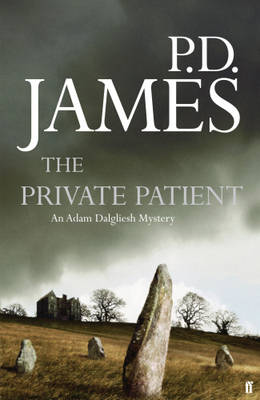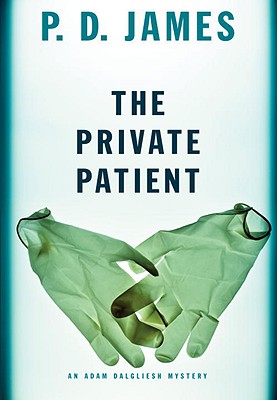Posts tagged ‘adamdalgliesh’
P. D. James — The Private Patient
I’ve never reviewed a crime novel on this blog, for the simple reason that I haven’t read one in a long time. But I was happy to make an exception for the latest from P. D. James, unchallengeable doyenne of the classic English murder mystery.
James is 88, and if the thought of churning out 400-page novels at that age impresses you, spare a thought for her detective, Adam Dalgliesh, who’s been wrestling culprits to the floor since 1962. I can only assume he’s been drinking the same elixir as James Bond, and gets younger and more muscular with each new case.

The setting for The Private Patient (2008) is, naturally, a decaying outpost of provincial privilege with a spooky and claustrophobic atmosphere. Rhoda Gradwyn, a fearless investigative journalist with a fair tally of accumulated enemies, books in to the private Dorset clinic of her plastic surgeon, George Chandler-Powell. The purpose of the visit: the removal of a deep scar across Gradwyn’s cheek, inflicted during childhood. The operation is completed successfully. But the following night, bandages still wrapped round her face, Rhoda is strangled in her bed.
Helpfully enough, the clinic, a beautiful yet intimidating Tudor manor house, is an enclosed space chock full of suspects. Two of the staff have longstanding grudges against Gradwyn, another has a dark past that has caused her to assume a new identity, one of Rhoda’s friends stands to gain from her will, and Chandler-Powell’s two medical assistants both have reasons for wanting to ruin the surgeon’s reputation. So whodunnit? And what is the significance of the ancient stone circle outside the manor, where a witch was once burned, and where strange lights were seen on the night of the murder?

The Private Patient is a novel resolute in its conformity to the conventions and clichés of its genre, but it’s a class act nonetheless — the work of a novelist rightly confident of the continuing power and relevance of the old Agatha Christie format. The story thrills and entices, like it should, but it’s also familiar and pleasurable, a book to be dipped into at leisure rather than one to be read from a grim compulsion to get to the end. James is simply a terrific writer, elegant, erudite and concise. She pries into her characters’ private thoughts and private places with a forensic precision and an eye for detail.
What James sees, perhaps more clearly than anyone writing today, is that the detective novel owes its persistence to its power as memento mori. Death touches everything yet remains hidden from view: “how briefly death is allowed to interfere with life,” muses Lettie, the clinic’s accountant, after Gradwyn’s death. Detective novels take us to the edge of that unspeakable abyss; but then, with their tidy resolutions, bring a necessary measure of solace and reassurance.
At one stage Dalgliesh contemplates that “few of us will die with the dignity for which we hope … Whether we choose to think of life as an impending happiness broken only by inevitable grief and disappointments, or as the proverbial veil of tears with brief interludes of joy, the pain will come.” But if this is an expression of the author’s inner fears, the book’s final lines (from the perspective of Annie, a rape victim only tangentially involved in the plot) counter them, arguing that, despite everything, we can draw consolation:
Deeds of horror are committed every minute and in the end those we love die. If the screams of all earth’s living creatures were one scream of pain, surely it would shake the stars. But we have love. It may seem a frail defence against the horrors of the world but we must hold fast and believe in it, for it is all we have.
If this should prove to be James’s final word, it will be an epitaph as crisp and measured and apt as the Dalgliesh series deserves.